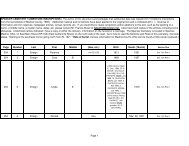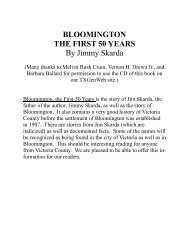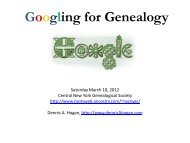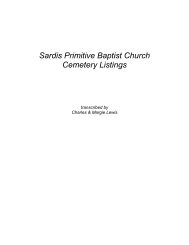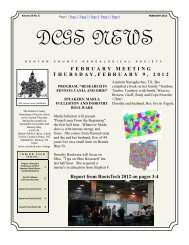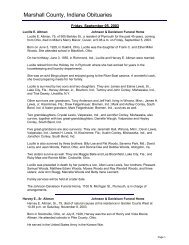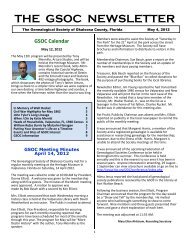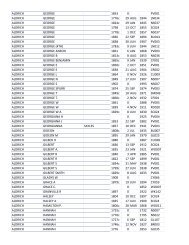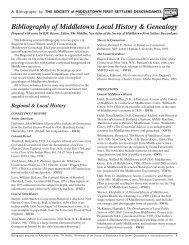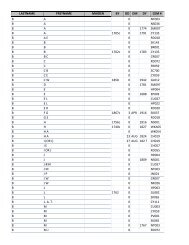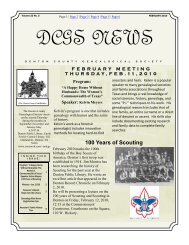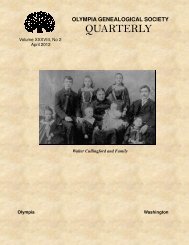Getting to the Roots of Your Family - RootsWeb - Ancestry.com
Getting to the Roots of Your Family - RootsWeb - Ancestry.com
Getting to the Roots of Your Family - RootsWeb - Ancestry.com
You also want an ePaper? Increase the reach of your titles
YUMPU automatically turns print PDFs into web optimized ePapers that Google loves.
• If <strong>the</strong> ances<strong>to</strong>r was born illegitimately, he may be listed in <strong>the</strong> records under a different surname<br />
from <strong>the</strong> one he used later in life. Possibly <strong>the</strong> locality listed was last place <strong>of</strong> residence or<br />
where <strong>the</strong> ances<strong>to</strong>r had lived for some time, but did not create records.<br />
Example:<br />
According <strong>to</strong> <strong>the</strong> Hamburg passenger list Friedrich Winterfeld, Maria Schmoldt, and <strong>the</strong>ir 9-month old baby Wilhelmine Schmoldt<br />
had last resided in “Blűcher, Mecklenburg” when <strong>the</strong>y emigrated in 1872. The goal was <strong>to</strong> find <strong>the</strong>ir births and marriage record.<br />
Solution:<br />
1. The Mecklenburg gazetteer listed four localities that included “Blűcher” in <strong>the</strong> place name. All were checked. Nei<strong>the</strong>r surname<br />
was found.<br />
2. The 1867 Census <strong>of</strong> Mecklenburg was searched for both surnames plus “Blűcher”. Winterfeld was not found, but Schmoldt<br />
families were found in “Blűcher, Ritteramt Wredenhagen.”<br />
3. None <strong>of</strong> <strong>the</strong> localities searched previously were associated with Wredenhagen, so “Blűcher + Wredenhagen” was entered in<strong>to</strong><br />
a search engine. This brought up a Wikipedia article about a village called Göhren-Lebbin, which had been called Blűcher from<br />
1843 <strong>to</strong> 1914. The Lu<strong>the</strong>ran church was in Poppentin, an affiliate <strong>of</strong> Sie<strong>to</strong>w parish.<br />
4. Baby Wilhelmine’s baptism record and her parents’ subsequent marriage were found in <strong>the</strong> separate books kept for Poppentin.<br />
PROBLEM #5: MY ANCESTOR HAS AN ENGLISH-SOUNDING NAME, BUT CENSUS RECORDS<br />
AND OTHER DOCUMENTS SUGGEST THAT HE IS FROM GERMANY.<br />
Surnames were frequently anglicized by clerks, census takers, and <strong>the</strong> immigrant himself, <strong>to</strong> facilitate<br />
record keeping and “blend in.” This can take <strong>the</strong> form <strong>of</strong> literal translations [Schwarz <strong>to</strong> Black], phonetic<br />
equivalents [Jüngling <strong>to</strong> Yingling], abbreviated or <strong>com</strong>pletely different names [<strong>of</strong>ten beginning with <strong>the</strong><br />
same letter as <strong>the</strong> original name], or a <strong>com</strong>bination <strong>of</strong> <strong>the</strong> above. <strong>Family</strong> members may choose <strong>to</strong><br />
change <strong>the</strong>ir names in different ways, or use both German and anglicized names at <strong>the</strong> same time in<br />
different settings.<br />
Example:<br />
Louis Churchbaugh’s <strong>to</strong>mbs<strong>to</strong>ne inscription in St. Louis stated that he was born in Stuttgart on 28 Sept 1833. He also had a bro<strong>the</strong>r<br />
Charles.<br />
Solution:<br />
1. The surname is probably anglicized. Proposed German spelling : Kirchbach[er]. The suffix „bach“ is <strong>of</strong>ten written as „baugh“ in<br />
English.<br />
2. The micr<strong>of</strong>ilmed church records for Stuttgart include family group sheets that cover all city parishes. A search produced one<br />
sheet listing Ferdinand Ludwig Kirchbacher, born 28 Sep 1833 , and his older bro<strong>the</strong>r Franz Joseph Karl as children. Additional<br />
notes spell <strong>the</strong>ir surnames “Kirchbach”.<br />
CONCLUSION<br />
Researchers can greatly increase <strong>the</strong>ir chances <strong>to</strong> successfully locate <strong>the</strong>ir “lost” ances<strong>to</strong>rs by following<br />
sound basic research practices und using a variety <strong>of</strong> inventive strategies.<br />
© July 2011 <strong>Family</strong>Search International. All rights reserved. No part <strong>of</strong> this document may be reprinted or reproduced in any<br />
form for any purpose without prior written permission.



